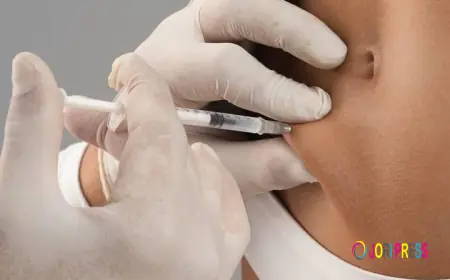Burning Sensation? When to Consider an STD Test

A burning sensation, especially during urination or intimate activities, can be alarming. While it might stem from something minor like a urinary tract infection (UTI) or irritation, it could also signal a sexually transmitted disease Std Test Dubai. Knowing when to consider an Std Test is crucial for maintaining sexual health and preventing complications.
This article explores the possible causes of a burning sensation, the STDs commonly linked to this symptom, and when getting tested is the right step.
Understanding the Burning Sensation
A burning feeling can occur for various reasons, and not all are related to STDs. However, if the discomfort is persistent or accompanied by other symptoms, it’s wise to consider an Std Test.
Common Non-STD Causes
Before assuming an STD, consider these possible causes:
-
Urinary Tract Infections (UTIs) – Bacterial infections in the urinary tract often cause a burning sensation during urination.
-
Yeast Infections – An overgrowth of yeast can lead to itching and burning, particularly in women.
-
Bacterial Vaginosis – An imbalance of vaginal bacteria may cause discomfort and unusual discharge.
-
Skin Irritation – Harsh soaps, tight clothing, or allergic reactions can cause temporary burning.
While these conditions are treatable, if symptoms persist or worsen, an Std Test may be necessary.
STDs That Cause a Burning Sensation
Several sexually transmitted infections can lead to a burning sensation. Recognizing these can help determine if testing is needed.
Chlamydia
Chlamydia is a common bacterial STD that often presents with mild or no symptoms. However, when symptoms appear, they may include:
-
Burning during urination
-
Unusual discharge
-
Pelvic pain (in women)
-
Testicular pain (in men)
Since chlamydia can lead to serious complications if untreated, an Std Test is recommended for sexually active individuals, especially those with new or multiple partners.
Gonorrhea
Gonorrhea, another bacterial infection, shares similar symptoms with chlamydia. Key signs include:
-
Burning or pain when urinating
-
Increased vaginal or penile discharge
-
Swelling or redness at the infection site
Like chlamydia, gonorrhea can cause long-term health issues if ignored, making timely testing essential.
Herpes (HSV)
Genital herpes, caused by the herpes simplex virus (HSV), often leads to:
-
Painful blisters or sores
-
Burning or itching before outbreaks
-
Flu-like symptoms during initial infection
Since herpes outbreaks can recur, an Std Test can confirm the diagnosis and help manage symptoms.
Trichomoniasis
This parasitic infection is another possible cause of burning. Symptoms may include:
-
Itching or irritation in the genital area
-
Frothy, foul-smelling discharge
-
Discomfort during intercourse
An Std Test can detect trichomoniasis, which is easily treatable with proper medication.
When Should You Get an STD Test?
Not every burning sensation requires an Std Test, but certain situations make testing a smart choice.
After Unprotected Sex
If you’ve had unprotected vaginal, anal, or oral sex with a new or non-exclusive partner, getting tested is a proactive step. Many STDs don’t show symptoms immediately, so early detection is key.
Experiencing Persistent Symptoms
If the burning sensation lasts more than a few days or is accompanied by other symptoms like discharge, sores, or pelvic pain, an Std Test can help identify the cause.
Before Starting a New Sexual Relationship
Getting tested before becoming sexually active with a new partner ensures both parties are aware of their STD status, promoting safer intimacy.
As Part of Regular Sexual Health Checkups
Even without symptoms, sexually active individuals should consider routine Std Test screenings, especially if they have multiple partners.
How STD Testing Works
Understanding the testing process can ease any concerns about getting checked.
Types of STD Tests
Different STDs require different testing methods:
-
Urine Tests – Used for chlamydia and gonorrhea.
-
Blood Tests – Detect HIV, syphilis, and herpes.
-
Swab Tests – Collect samples from genital sores or discharge for herpes, trichomoniasis, or other infections.
What to Expect During Testing
The process is usually quick and straightforward:
-
A healthcare provider will ask about symptoms and sexual history.
-
Depending on the test, you may provide a urine sample, blood sample, or swab.
-
Results are typically available within a few days.
Confidentiality and Privacy
STD testing is confidential, and healthcare providers follow strict privacy protocols. There’s no need to worry about personal information being disclosed.
Preventing STDs in the Future
While testing is important, prevention is equally crucial.

Practice Safe Sex
Using condoms consistently and correctly reduces the risk of most STDs. Dental dams can also provide protection during oral sex.
Open Communication
Discussing sexual health with partners fosters trust and ensures mutual awareness of STD status.
Regular Screenings
Routine Std Test screenings help catch infections early, even without symptoms.
Final Thoughts
A burning sensation shouldn’t be ignored, especially if it persists or comes with other concerning symptoms. While not every case points to an Std Test in Dubai, getting tested provides clarity and peace of mind. Early detection through an Std Test allows for prompt treatment, reducing the risk of complications and protecting both your health and your partner’s.
If you’re experiencing discomfort or have concerns about potential exposure, consider scheduling an Std Test—it’s a simple step toward maintaining long-term sexual wellness.
What's Your Reaction?
 Like
0
Like
0
 Dislike
0
Dislike
0
 Love
0
Love
0
 Funny
0
Funny
0
 Angry
0
Angry
0
 Sad
0
Sad
0
 Wow
0
Wow
0


















































